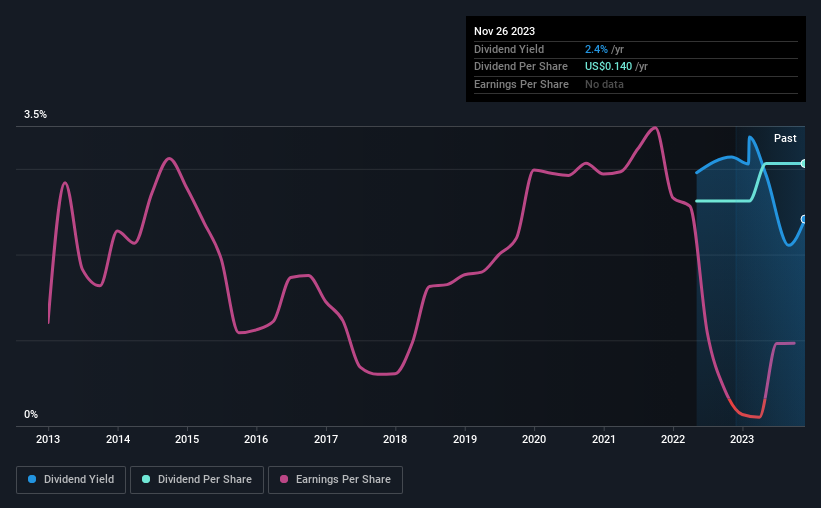Should Income Investors Look At LifeVantage Corporation (NASDAQ:LFVN) Before Its Ex-Dividend?
LifeVantage Corporation (NASDAQ:LFVN) stock is about to trade ex-dividend in 3 days. The ex-dividend date occurs one day before the record date which is the day on which shareholders need to be on the company's books in order to receive a dividend. It is important to be aware of the ex-dividend date because any trade on the stock needs to have been settled on or before the record date. Accordingly, LifeVantage investors that purchase the stock on or after the 30th of November will not receive the dividend, which will be paid on the 15th of December.
The company's next dividend payment will be US$0.035 per share, and in the last 12 months, the company paid a total of US$0.14 per share. Based on the last year's worth of payments, LifeVantage stock has a trailing yield of around 2.4% on the current share price of $5.8. Dividends are a major contributor to investment returns for long term holders, but only if the dividend continues to be paid. That's why we should always check whether the dividend payments appear sustainable, and if the company is growing.
See our latest analysis for LifeVantage
Dividends are typically paid out of company income, so if a company pays out more than it earned, its dividend is usually at a higher risk of being cut. LifeVantage is paying out an acceptable 64% of its profit, a common payout level among most companies. Yet cash flow is typically more important than profit for assessing dividend sustainability, so we should always check if the company generated enough cash to afford its dividend. It paid out more than half (71%) of its free cash flow in the past year, which is within an average range for most companies.
It's positive to see that LifeVantage's dividend is covered by both profits and cash flow, since this is generally a sign that the dividend is sustainable, and a lower payout ratio usually suggests a greater margin of safety before the dividend gets cut.
Click here to see how much of its profit LifeVantage paid out over the last 12 months.
Have Earnings And Dividends Been Growing?
Businesses with shrinking earnings are tricky from a dividend perspective. If business enters a downturn and the dividend is cut, the company could see its value fall precipitously. LifeVantage's earnings per share have fallen at approximately 13% a year over the previous five years. Such a sharp decline casts doubt on the future sustainability of the dividend.
Unfortunately LifeVantage has only been paying a dividend for a year or so, so there's not much of a history to draw insight from.
To Sum It Up
From a dividend perspective, should investors buy or avoid LifeVantage? It's never good to see earnings per share shrinking, but at least the dividend payout ratios appear reasonable. We're aware though that if earnings continue to decline, the dividend could be at risk. It's not that we think LifeVantage is a bad company, but these characteristics don't generally lead to outstanding dividend performance.
Although, if you're still interested in LifeVantage and want to know more, you'll find it very useful to know what risks this stock faces. For example, LifeVantage has 4 warning signs (and 2 which can't be ignored) we think you should know about.
If you're in the market for strong dividend payers, we recommend checking our selection of top dividend stocks.
Have feedback on this article? Concerned about the content? Get in touch with us directly. Alternatively, email editorial-team (at) simplywallst.com.
This article by Simply Wall St is general in nature. We provide commentary based on historical data and analyst forecasts only using an unbiased methodology and our articles are not intended to be financial advice. It does not constitute a recommendation to buy or sell any stock, and does not take account of your objectives, or your financial situation. We aim to bring you long-term focused analysis driven by fundamental data. Note that our analysis may not factor in the latest price-sensitive company announcements or qualitative material. Simply Wall St has no position in any stocks mentioned.

